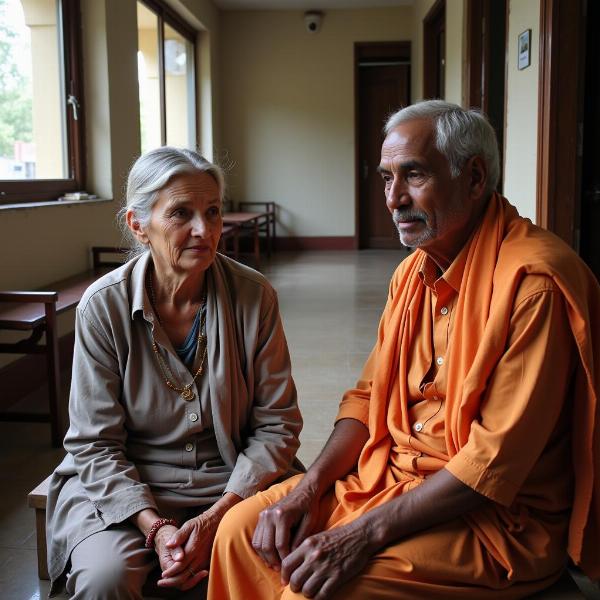The Hindi meaning of “old” can be quite nuanced, depending on the context and what you’re trying to describe. While the most common translation is “puraana” (पुराना), several other words convey the idea of age, antiquity, or being past one’s prime. Understanding these subtle differences can significantly enhance your understanding of the Hindi language and Indian culture.
Different Ways to Say “Old” in Hindi
Let’s delve deeper into the various Hindi words that express the concept of “old.”
Puraana (पुराना): The Most Common Translation
“Puraana” is the most straightforward and frequently used word for “old.” It refers to something that has existed for a long time or is no longer new. You can use it for objects, buildings, clothes, or even ideas.
Example: “Yeh puraana ghar hai.” (यह पुराना घर है।) – This is an old house.
Pracheen (प्राचीन): Ancient or Antique
“pracheen” implies a sense of antiquity and historical significance. It’s used for things that are very old, often of historical or archaeological value.
Example: “Yeh pracheen mandira hai.” (यह प्राचीन मंदिर है।) – This is an ancient temple.
Vruddha (वृद्ध): Old (referring to people)
When referring to elderly people, “vruddha” is the respectful and appropriate term. It acknowledges their age and experience.
Example: “Mere dada ji vruddha hain.” (मेरे दादा जी वृद्ध हैं।) – My grandfather is old.
Budhha (बुढ़ा/बुढ़ी): Old (referring to people – informal)
While technically meaning “old,” “budhha” can sometimes carry a slightly negative connotation, suggesting frailty or weakness. It’s best used informally and with caution. “Budhi” is the feminine form.
Example: “Voh budhha aadmi raste par chal raha tha.” (वह बुढ़ा आदमी रास्ते पर चल रहा था।) – That old man was walking on the road.
Purana Zamana (पुराना ज़माना): Old Times
“Purana zamana” refers to a bygone era or the “old days.” It’s often used nostalgically or to contrast the past with the present.
Example: “Purane zamane mein, log zyada saada jeevan jeete the.” (पुराने ज़माने में, लोग ज़्यादा सादा जीवन जीते थे।) – In the old days, people lived simpler lives.
What does “Old” mean in different contexts?
The specific Hindi word you use for “old” depends heavily on the context. Are you talking about an old book, an old friend, or an old custom?
Old Objects
For inanimate objects, “puraana” is generally suitable. However, if the object is antique or has historical value, “pracheen” is more appropriate.
Old People
When referring to people, use “vruddha” for respectful address. “Budhha/budhi” should be reserved for informal contexts, and even then, used with sensitivity.
 Elderly People in India
Elderly People in India
Old Ideas or Customs
For abstract concepts like ideas or customs, “puraana” or “pracheen” can both be used, depending on the nuance you want to convey. “Pracheen” often suggests a tradition that has been passed down through generations.
How old is old?
The concept of “old” is relative. A five-year-old car might be considered old, while a five-year-old child is certainly not. Context is key.
Old is Gold: The Value of Age in Indian Culture
In Indian culture, age is often associated with wisdom and experience. Elders are revered and respected, and their advice is highly valued. This cultural perspective influences the language used to describe age.
Dr. Anamika Sharma, a renowned linguist specializing in Hindi, explains, “The Hindi language reflects the cultural reverence for age. Words like ‘vruddha’ and ‘pracheen’ carry a positive connotation, highlighting the value placed on experience and history.”
Conclusion
Understanding the nuances of “old” in Hindi allows you to communicate more effectively and respectfully. While “puraana” is the most common translation, other words like “pracheen,” “vruddha,” and “budhha/budhi” offer more specific meanings and reflect the rich cultural context of age in India. Choosing the right word can make all the difference in conveying your intended meaning accurately and respectfully.
FAQ
-
What is the most common Hindi word for “old”? “Puraana” (पुराना) is the most common and versatile word for “old.”
-
How do you say “old man” respectfully in Hindi? “Vruddha purush” (वृद्ध पुरुष) is a respectful way to say “old man.”
-
What is the difference between “puraana” and “pracheen”? “Puraana” means simply “old,” while “pracheen” implies antiquity and historical significance.
-
Is “budhha” a polite way to refer to an elderly person? “Budhha/Budhi” can be considered informal and potentially disrespectful, depending on the context. “Vruddha” is generally preferred for polite address.
-
How do you say “old times” in Hindi? “Purana zamana” (पुराना ज़माना) translates to “old times.”
-
What is the Hindi meaning of “old friend”? “Purana dost” (पुराना दोस्त) means “old friend.”
-
How does Indian culture view old age? Indian culture generally reveres old age, associating it with wisdom and experience.
Meaning-Hindi.in is your trusted partner for accurate and culturally sensitive Hindi translations. We offer a wide range of translation services, from business and legal documents to website localization and educational materials. Our expert linguists ensure your message is conveyed with precision and respect. Need help with your Hindi translation project? Contact us today at [email protected] or call us at +91 11-4502-7584. Meaning-Hindi.in is your one-stop solution for all your Hindi translation needs.